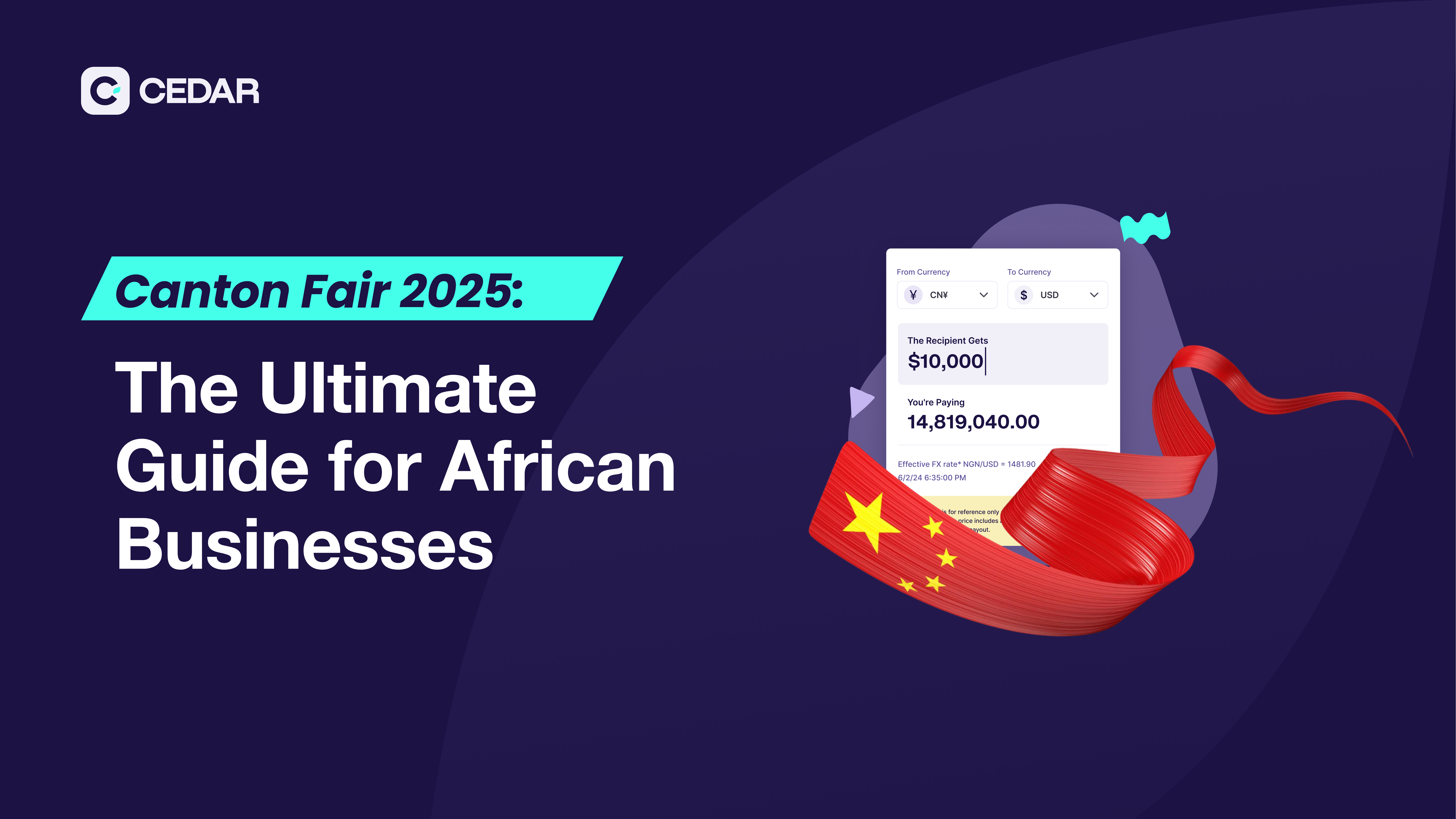公司

如果你是一位非洲企业主,想要采购优质产品、扩大供应商网络或探索新的市场机会,那么你的2025年日历上肯定有一个地方:中国广州的广交会。
通常被称为 “贸易奥林匹克”, 广交会是世界上规模最大、历史最悠久的贸易展览,吸引了超过 来自 214 个国家的 253,000 名国际买家 和地区,非洲企业是增长最快的买家群体之一。每年,成千上万的非洲进口商、商人和企业主抵达中国广州,采购从电子产品到纺织品、建筑材料和消费品的所有物品。
但是,许多人空手而归,或者以不太理想的交易离开,因为他们不明白,广交会的采购成功不仅仅是寻找产品;而是拥有运营基础设施,能够比竞争对手更快地完成交易。
本指南从展前和展后活动中引导您了解如何最大限度地利用2025年广交会。更重要的是,它向您展示了如何将供应商联系转变为真实、有利可图的业务关系。
广交会(也称为中国进出口商品交易会)每年在中国广州举行两次。按展览规模计算,这是世界上最大的贸易活动,包括 超过 31,000 家参展公司,与 超过3,300家新参展商加入了即将举行的第138届会议的阵容。
从这个角度来看:展会跨度 整个展览区域约有74,000个展位 面积约为155万平方米。这相当于 200 多个足球场的产品展示区、社交机会和采购可能性。
对于非洲企业而言,广交会不仅仅是一次采购活动,还代表着更为深刻的意义。它可以直接进入世界制造业的支柱,其规模和价格在其他地方是罕见的。
非洲进口商和企业主出于特定的高价值原因参加广交会:
第 138 届广交会在 2025 年 10 月至 11 月期间分三个阶段举行:
您的第一个战略决策是决定:哪个阶段与您的产品类别一致?
广交会以两种形式运作:实体现场展览和在线虚拟博览会。大多数非洲企业优先考虑实体体验,因为它允许进行面对面的谈判、产品抽样和建立关系,而这些要素是数字互动无法复制的。
博览会还分三个阶段举行:
第 1 阶段:聚焦工业与技术
第 2 阶段:消费品和家居摆设
第 3 阶段:纺织品、服装和健康产品
供应商的庞大数量令人震惊。 超过 31,000 家参展公司 意味着你可以访问:
这场比赛对你有利。供应商想要您的业务,并将提供有竞争力的价格、灵活的条款和定制选项来赢得业务。
1。成本领导力
与通过分销商或在线市场购买相比,在广交会上直接从中国制造商那里购买产品可以将您的产品成本降低15-40%。对于10万美元的订单,可以节省15,000至40,000美元的成本或利润率的提高。
2。质量保证
在提交批量订单之前,您需要检查产品。您可以亲自验证认证、检查制造流程和评估质量控制体系。
3.加快上市速度
与制造商的直接关系意味着更短的交货时间。喜欢您的供应商将优先处理您的订单,缩短生产时间并加快发货。
4。定制和创新
许多非洲市场都有特定的要求,例如电压标准、包装偏好、品牌需求。与在线市场相比,直接供应商可以更灵活地满足这些要求。
既然你明白了广交会为何如此重要,让我们来谈谈如何有效地做好准备。
在您抵达广州之前,广交会的成功就开始了。鉴于距离即将到来的博览会只有6天的时间,我们假设您已经注册,获得了邀请并整理了物流信息。
为了最大限度地做好准备,你应该做以下两件事:
1。提前研究
使用广交会在线名录
这个 广交会官方网站 维护所有参展商的在线名录,按产品类别和公司简介进行组织。
在您的首选阶段之前开始研究:
利用在线平台
使用中国制造、阿里巴巴和环球资源等平台来补充您的研究。交叉引用您在广交会名录中找到的供应商,以验证合法性和客户反馈。
创建候选名单
将您的 15-20 个潜在客户缩小到 8-10 个优先供应商。这些供应商应具备以下条件:
2。定义你的目标
出发之前,请先弄清楚成功是什么样子:
采购目标:
关系目标:
产品目标:
把这些目标写下来。他们将在博览会上指导你的决策。
第一次参观广交会可能会让人不知所措。以下是预期内容以及如何高效导航。
想象一下,一个像 200 多个足球场一样大小的空间,里面摆满了产品展示柜、谈判区和网络中心。每个参展商都有一个展位(大型公司通常有多个展位),展示他们的产品、公司信息和目录。
气氛很专业,但充满活力。供应商正在积极寻找新的买家,因此他们将向您介绍产品、定价建议和名片。
1。优先考虑您的候选名单
利用第一天拜访您预先研究过的优先供应商。这完成了两件事:
2。为探索留出空间
在访问您的候选清单时,探索邻近的展位和附近的供应商。您的一些最优惠价格可能来自意想不到的发现——您没有预先研究过的供应商,但提供了极具吸引力的价格或产品。
3.时间管理
博览会规模巨大。你不能拜访每个供应商。专注于质量会议,而不是数量。与每个优先供应商共度15-20分钟,足够长的时间来讨论您的需求和交换信息。
为了建立最优质的连接,需要注意以下几点:
1。语言障碍
大多数大型供应商都有讲英语的销售代表。对于小型供应商,请携带:
2。名片仪式
名片是中国商业文化的基石。与供应商会面时:
这种仪式可以建立融洽的关系,表现出对中国商业习俗的尊重。
3.充分利用小组会议
许多供应商举办团体演示或简报会。参加这些活动——他们通常会透露您在一对一对话中无法学到的生产能力、认证和竞争优势。
1。认证很重要,以下是一些需要注意的地方:
要求供应商提供其认证副本。合法供应商自豪地展示它们。
2。评估生产能力
询问供应商:
这告诉你他们是否可以处理你的订单量和时间表。
3.了解最低订购量 (MOQ)
最小起订量差异很大。一些供应商每份订单接受 100 件商品;其他供应商则需要 10,000 多件。协商与您的业务一致的最小起订量。最小起订量意味着更大的灵活性;更大的最小起订量意味着更好的单位价格。
4。评估付款灵活性
这对非洲企业至关重要。问:
支付灵活性通常比 5% 的价格折扣更重要。提供Net-30条款的供应商比提供5%低价格但要求100%预付款的供应商更有价值。
产品样本
索取关键产品的样品。大多数供应商在展会期间以最低成本(通常免费)提供样品。
要点:
报价
索取书面报价,内容包括:
在做出决定之前,请务必比较3-4家供应商的报价。
合同
大宗订单应在合同中正式确定。关键要素:
许多供应商提供模板合同。但是,在签署之前,请务必接受法律顾问的审查。
重要提示:许多参展商现在接受数字跨境支付。与3-4年前相比,这是一个重大转变。几家大型供应商接受:
这种转变对非洲企业至关重要,因为这意味着除了传统银行业务之外,您还有其他支付选项,而传统银行业务可能既缓慢又昂贵。我们稍后将分享更多相关信息。
博览会结束了。你带着名片、样本、报价和想法回家。现在,真正的工作开始了:将联系人转化为实际的、有利可图的业务关系。
1。立即随访(48 小时内)
在展会后的48小时内向您的优先供应商发送个性化电子邮件。以下是你可以使用的简短模板:
主题行:“广交会的后续行动—— [您的公司名称]”
电子邮件正文:
示例:“我很高兴在10月16日的广交会上见到你。你们的 LED 照明系统给我留下了特别深刻的印象。我有兴趣下单 5,000 件的初始订单,想确认价格、交货时间和您的付款条件。我们能安排下周的电话吗?”
2。彻底审查供应商
在下大订单之前,请验证供应商的合法性:
参观工厂(理想但可选)
一些供应商向认真的买家提供工厂参观服务。如果可行,请在第一次下单之前安排一次参观。观察:
参考文献和评论
财务验证
大订单需要对供应商的稳定性充满信心,因此:
3.协商明确的付款条款
这是许多非洲进口商陷入困境的地方。常见的付款期限选项:
谈判策略:首先提出 Net-30 或 50/50 条款。大多数供应商会以 100% 的预付金进行反击。在 50/50 或 60/40 的中间集合。将其描述为:“我是一个认真的买家,正在寻找长期合作关系。优惠的付款条件帮助我承诺更大的交易量。”
4。建立质量控制标准
在首次发货之前,请商定:
你想以书面形式写出来,因为它们可以保护你和供应商。
广交会结束后,您将管理多个供应商关系,兼顾不同的付款时间表并进行货币兑换。
这是大多数非洲企业遇到的运营摩擦的地方,这些摩擦侵蚀了他们在广交会节省的成本。Cedar Money 简化了这种复杂性。
1。多币种支持
使用供应商的首选货币向供应商付款:美元、人民币、欧元、英镑。
2。在 24 小时内结算
与传统银行业务(5-7天)不同,Cedar通过稳定币轨道和战略合作伙伴关系在不到24小时的时间内结算付款。
这在操作上意味着什么?
对于200万美元的付款,5至6天的加速可以避免数千美元的延迟。
3.有竞争力的外汇汇率
Cedar以具有竞争力的市场汇率对外汇兑换进行定价,没有隐性加价,没有未公开的费用。
4。透明的费用结构
你确切地知道你要付多少钱。汇率中没有隐藏任何意外费用。
5。进入 190 多个国家
Cedar 可以向中国、美国、越南、印度和其他190多个国家汇款。无论您是向广州制造商还是向其他国家的供应商付款,Cedar 都能满足您的需求。
广交会不仅仅是一次采购之旅。这是非洲企业通往全球增长的门户。
每年,成千上万的非洲进口商走过这74,000个展位,与供应商会面,谈判协议,然后回国,对新产品线和节省的成本感到兴奋。但是,许多人从未意识到自己的全部广交会潜力,因为他们缺乏运营基础设施,无法将这些联系转化为稳定、有利可图的业务。
在广交会上真正取得成功的进口商是:
准备好在本届广交会进行更明智的交易,当需要结算付款时,就让吧 雪松钱 帮助您无缝地完成任务。 今天就开始吧!

